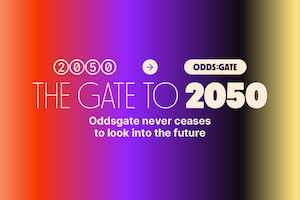Oddsgate chief marketing officer Wagner Fernandes outlines the company's Gate to 2050 report and the megatrends reshaping the igaming landscape.

Imagine this: it’s a Friday night in 2050. You’re reclining on a sofa in São Paulo, wearing lightweight smart glasses that feel like designer frames.
With a blink, you’re transported into a hyper-realistic casino floating in a digital Macau. You wager a fraction of a crypto-token, backed by a central bank and stored in a biometric wallet woven into your neural signature. The bet is sealed by a smart contract, executed in milliseconds across a decentralized blockchain ledger. No banks. No brokers. No waiting.
Now zoom out.
This isn’t science fiction. It’s a plausible fragment of what our entertainment ecosystems may look like in just 25 years - a future not waiting passively in the wings, but actively being constructed, line by line of code, policy and prediction.
Oddsgate, a Portuguese igaming platform provider, dared to sketch this long view in Gate to 2050, a foresight study developed in partnership with ALVA Research & Consulting. Unlike traditional market forecasts, this project bypassed short-term speculation in favour of strategic horizon-scanning. Their approach blended expert interviews across five continents, 200 field surveys conducted during major industry events and the analysis of 21 transactional variables - from user identity, payment architecture and data privacy to environmental regulation, AI ethics and the cultural dimensions of play. These indicators tie gaming to broader finance, sustainability and society movements.
The result? A data-backed narrative of five interconnected megatrends, tested against political uncertainty, demographic shifts and technological acceleration. ALVA’s methodology, borrowed from scenario-planning frameworks used by Fortune 500 companies and governments, follows a three-step sequence: signal scanning, future imaging and narrative synthesis. In other words, not a prediction, but a structured invitation to imagine responsibly. To anticipate what’s coming and how we might shape it.
Avatars, Algorithms, and the New Game Economy
Artificial intelligence is the first megatrend reshaping the landscape—not the gimmicky chatbot with quirky comebacks or the virtual assistant still tripping over basic commands, but an embedded infrastructure that underpins personalisation, risk management and real-time decision-making. By 2050, AI will generate odds, curate hyper-specific interfaces and detect harmful behavior before it becomes a regulatory headline.
In this reality, not offering Netflix-level personalisation will be a red flag. Retention - not acquisition - becomes the new black.
If AI is the brain, blockchain is the backbone. Far from a speculative playground, blockchain by mid-century will anchor dispute resolution, automate smart-contract settlement, and support decentralised governance models that blur the lines between operator and player. Trust will no longer be declared. It will be encoded.
Immersion as Default: The Rise of Extended Reality
The interface is changing, too. Long caught between hype and hope, augmented and virtual realities will reach critical mass. Casinos in your living room, live sports enhanced with real-time overlays and esports watched through interactive 3D feeds aren’t gimmicks; they’re natural evolutions of attention economics. The new UX is immersive, invisible and increasingly indistinguishable from "real life."
This brings new challenges in regulation, identity and social impact. The more engaging the game, the harder it is to log off.
Sustainability Isn’t a Side Quest
Behind the immersive glitz lies an ecological reckoning. Data centers, streaming infrastructure and cross-border platforms consume energy, and regulators notice. ESG reporting will soon migrate from marketing decks to licensing conditions. Carbon-aware tech stacks, renewable-powered edge data centers and AI-driven harm detection will be part of compliance, not virtue signalling.
Over half the global GDP is already nature-dependent, so the entertainment sector can no longer afford to treat the environment as a backdrop.
Shifting Centers of Gravity
Then comes the geographic reset. The future belongs to mobile-first Africa, crypto-fluent Asia and a digitally awakening Latin America.
With this shift, the industry must shed one-size-fits-all approaches. Operators must master cultural hyperlocalisation, without compromising brand consistency, to stay relevant in an increasingly fragmented global market.
Gaming as a Laboratory for Society
These points lead to a final insight: games, in their digital multiplicity, are becoming society’s new sandbox. Payment systems, identity verification, economic experiments, even political organisations - much of what we will navigate in the "real world" is already being prototyped in gaming ecosystems.
Igaming isn’t just an industry. It’s a window into how trust is built, how communities are formed, and how risk is negotiated in real time. With projected revenues nearing US$600bn by mid-century, the sector has weight and responsibility.
As Gate to 2050 reminds us, the value of foresight lies not in predicting the future with precision, but in preparing to meet it with intention. The authors frame the publication as a “beta release," a living document meant to evolve.
Continuous horizon scanning, early warning indicators and annual scenario refreshes are recommended to keep its insights aligned with reality. In practice, that means feeding back real-world data: from regulatory shifts in Brazil to 6G infrastructure rollouts in South Korea, every signal becomes input for recalibrating probabilistic forecasts. The study notes that “being proactive means never ceasing to look into the future.”
More than a report, Gate to 2050 is a call to conversation. Oddsgate has publicly made the complete English edition available on its website to encourage open dialogue and global engagement. It is hosting a series of regional workshops on the theme.
Because the future isn’t random, it’s a system in beta. And we’re all already playing.

